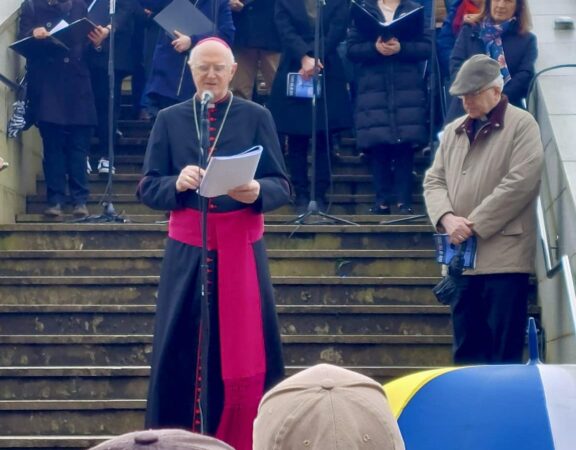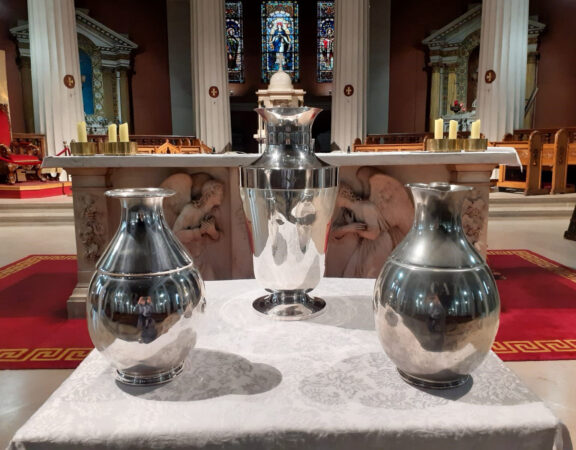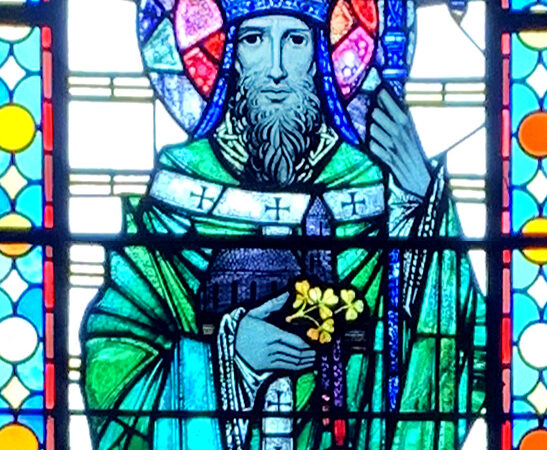Accord Advent Mass,
Second Sunday of Advent,
All Hallows College, December 3rd
As we move forward in our celebration of Advent we encounter in our Gospel reading this evening the great figure of John the Baptist. He is one of the most striking saints in the Church’s calendar, a Jewish Saint, a striking figure in his own time and a figure who still speaks to our times.
John is one of the few figures of the New Testament whose name is mentioned even by the secular historians of his time for the enormous impact that he had on society. Extraordinary crowds, from every level in society, went out to see him in the wilderness. His preaching created an acute awareness that something new and significant was about to take place.
John’s message was not preached in the conventional places of religious worship or administration. John stood out as someone radically different and who challenged convention. He did not preach a safe, comfortable, politically correct religion. John was not to be found in the comfort of the centres of power nor could his message possibly ever have been transferred to such a world. It was the obvious integrity of his life-style and of his message which generated repentance among some; that same message also generated fear and apprehension among others. John placed his hearers before a choice.
John appears in the wilderness. His message is something new. It is not simply something added on to existing piety and practice. John’s message announced that something completely new was about to break into human history, which would require his hearers to repent their ways and look at their lives in a new way.
We live in a world which so often self-defines itself and its values. Those who have a message to bring or an image to build or correct, carry out surveys which try to tell us what we think; they turn to spin doctors who try to shape what we should think; they sell their stories in such a way that they fit into and are supported by the sentiment of the moment. If necessary supposed enemies will be shot-down or silenced. What is the result: the spin very often wins the day and we begin to think as others wish us to think. But that spin lasts only until the day when it is decided that the spin has to go in a different direction.
John teaches us another way. A precondition for any kind of personal religious renewal or renewal in the Church is that we like John must first go into the wilderness. We have to take a step away from the flavour of the day. We have to ask the questions that bring us towards a deeper understanding about life and about who we really are. It is only in the wilderness that we can make a judgement and discernment about the conventional wisdom of our times and any time in history. Even in our own times, like those who went out to see John we are called to leave behind the conventions of the day, the comfort of our ways and our securities, and go into the wilderness, back to the primitive simplicity of life, with all its risks.
That John’s message required discernment about the model of everyday society is evident in John’s own life-style. His clothing, his food, his habitat are radical in their simplicity. Through his own life, he is telling his hearers and us that if we want to be able to appreciate the new times that will come with Jesus then we have to detach ourselves from every form of superficiality, in our daily life but also in our religious piety.
John makes it clear that the one who is to come will baptise in the spirit. This means that he would require of his followers not a religion of outward observances, or empty spin, but a radical style of integrity of life and sincerity.
I am delighted to be with you this evening and to have an opportunity to thank you for your work with Accord Dublin. Last year you will remember that we had to abandon our Mass because of the snow. I thank Barbara Gilroy for the invitation and the effort that she and her co-workers put into this annual event. I greet you all, with your spouses and children.
In your work in support of marriage and the family, in marriage preparation, in counselling and in schools, you are called in a way to be like John the Baptist, as he prepared people to encounter the message of Jesus. There many so many in our world who are caught up in the superficiality of modern life and think that this is the path to happiness, when in the end its leaves so many with a profound emptiness. You encounter in your work many who are the victims of the pace and emptiness of our times and who end-up rudderless, in anxiety, brokenness and stress.
In that world, Accord itself must become so to speak “wilderness”, a space where people can be helped and accompanied as they strip themselves of superficiality and false hopes, and adopt a deeper vision of what their lives are about, as they encounter and embrace the authenticity of radical simplicity in life. A return to radial simplicity is not easy. It means abandoning conventional security and affronting the risk; risk not in the sense of danger but more so in the sense of adventure and challenge.
Accord’s understanding of marriage is not just based on surveys and media projections. Today, as you well know, there is a real danger that the difficulties that are experienced in marriages–with the unfortunate failure of many marriages which had set out full of hope– that we ourselves can begin to be trapped into feeling that marital fidelity is only for the few; that the fact that many do not make it means that we should not challenge all to try to make it. As believers, as counselors, as people committed to the ideal of Christian marriage we must learn a new language which enables us to proclaim and celebrate our vision of marriage, not in terms which appear negative and judgmental towards those who fail to reach those ideals.
Christian marriage, however, is and will always remain an ideal, a challenge. Yes it is a risk, but a risk worth taking, a risk that does not paralyse us, but opens out something which becomes more worthwhile as our life’s journey moves on. Marital fidelity is a reflection of the fact that God has always remained faithful even to those who fail humanly in the call to fidelity. The sacrament of marriage is not just an event on the wedding day; it is about a God who is faithful, who teaches us what fidelity means, who stands alongside us to accompany us in our weakness.
One of the ways in which Accord can create a new climate regarding marriage and the family is to stress the happiness and joy which come from being faithful.
To do that we have to encourage and help couples to understand the wilderness, not in the sense of bewilderment, but of avoiding empty and unattainable expectations. Dream marriages are not the fruit of empty dreaming, but of day to day overcoming fixation only on self and realising that happiness is enriched by a true sense of mutuality and love, as Jesus gave himself.
In thanking you for your work may I wish you all and your families the blessings of the God of love, who appeared in our world in the stark simplicity of the Christ child.









